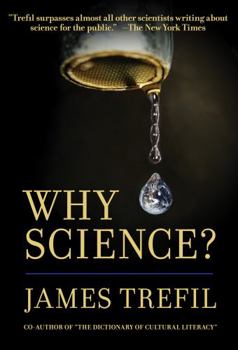Why Science?
Select Format
Select Condition 
Book Overview
With conviction and clarity, prize-winning scientist and bestselling author James Trefil explains why everyone needs to be "scientifically literate" and, therefore, why our schools must teach the fundamental principles of scientific literacy to every student. He lays out these principles straightforwardly, so that educators--and everyone who is interested in education--can understand exactly what they are. Trefil knows that initiating a national...
Format:Paperback
Language:English
ISBN:0807748307
ISBN13:9780807748305
Release Date:November 2007
Publisher:Teachers College Press
Length:224 Pages
Weight:0.74 lbs.
Dimensions:0.6" x 6.3" x 8.9"
Customer Reviews
2 ratings
Is a scientific education needed to fully understand the world even for the lay?
Published by Thriftbooks.com User , 16 years ago
Is a scientific education needed to fully understand the world even for the lay? "Why Science?" is a call for America to increase their scientific literacy for a more perfect union - saying understanding of the fundamentals of science - natural selection, electricity, magnetism, and others - are necessary to understanding the very principles of modern society. "Why Science?" is a must for any community library science, social issues, or education shelf.
The Age-Old Question
Published by Thriftbooks.com User , 16 years ago
In my third year of teaching high school science (back in the early 1990's), I came to an epiphany. I had spent two years pushing my students towards the kind of "hard" science that I had spent many years studying and about which I had great passion. I had some success but I wasn't reaching as many students as I'd hoped as an idealistic young teacher. Then, sometime between years two and three, I changed my goal. Instead of trying to turn my students into scientists, I would try to help them become scientifically literate. From that moment, I believe I became a better and more successful teacher. I tell this story to underline the fact that the concept of science literacy is not a new one. Dr. Trefil has written a wonderful book on the subject but, despite the impression he might give, he is by no means blazing a new trail here. His work with E. D. Hirsch and the cultural literacy gurus gives him a certain cache and it is easy to see how this work grew out of his involvement with that project; however, the question of literacy--cultural, scientific or otherwise--is basically an age-old question: what is it that an educated person should know and when should we teach it to them? I admire much of what Trefil has done here. The early chapters, in particular, on what science is and is not and his definition of scientific literacy are informative and useful. On the other hand, when he starts to get into the field of education and its impact on scientific literacy, I think his conclusions are much more debatable. For example, though I agree in principle with his conclusions that we tend towards hysteria in comparing our scientific graduates to those of other countries, I feel strongly that America is behind other countries in many ways. In Trefil's analysis, per capita comparisons are the key. Still, raw numbers play a role. We may be competing with China per capita, but they still have over 200,000 more brains educated in science which gives them more opportunity to come up with the next great new idea. And he doesn't even comment how American-educated internationals are now much more likely to return to their country of origin rather than stay in America as they used to do. We are in a crisis and something needs to be done. Of course something needs to be done and Trefil has some good suggestions. I like the idea of his "great ideas" approach to scientific literacy though I don't see why his ordering is particularly necessary and I might vary the topics a bit. I'm a bit uncomfortable with his rather high-handed dismissal of inquiry-based learning which, in my experience, is very powerful for students. I'm also not as high on the importance of his "third way"--modeling is important but that does not reduce the value of theory and experiment. But this is where we get down to the brass tacks of that age-old question, don't we? The debate will never end. When it comes right down to it, I think he falls into the very trap he mentio






